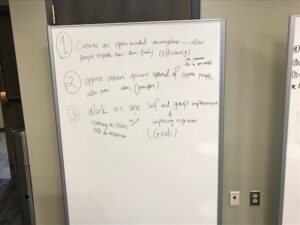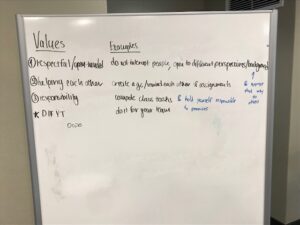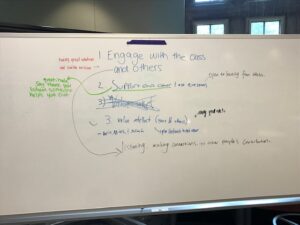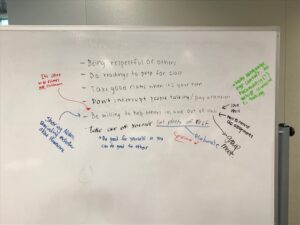I agree with the Class Commitments
Author: Angelos Charalampos Bouras
Questions for Tuesday’s lunch:
(Kelvin and Terrence) Obviously, being in prison has shaped your life paths and personality. But to what extent do you think that your incarceration has defined your life?
(Kelvin and Terrence) One of the takeaways of the book is the injustice within our justice system. What are some things that you think could be applied to get closer to a just and meritocratic society?
(Kelvin and Terrence) What are the main takeaways of having contributed to the publication of a book?
(Kelvin and Terrence) What are some things you have regret in life and why?
(David Coogan) How does it feel to have been engaged to that extent with people in prison but have not been one of them? Did you start seeing specific patterns, understanding them better, and empathizing with them?
For Thursday’s lesson, I prepared by focusing on a specific character that was particularly interesting and motivated me to delve more into his story. Nanji had one of the most significant personal changes during his lifetime with his ideology and approach in life being shifted during his time in prison.
Throughout Nanji’s story, some common themes were highlighted that convey bigger ideas about life. Firstly, the common theme of identity was challenged through his struggles of questioning himself. Under the umbrella of identity, many other aspects come into play including religion and race. Nanji communicates the broader concept of religion as an incentive for change and as a supporting mechanism. Race is perceived as a characteristic that goes beyond skin color being a shaping element of his character development. Finally, a driving force for positive change in his lifestyle and personality is the connection with family through the characters of his wife, daughter even her grandma, empowering the concept of transmissive love.
| Page | Summary |
| 26 | Realizes his mother is dead by trying to wake her up |
| 35 | Highlights the differences between races and embraces his identity |
| 76 | Thoroughly describes and comments on the environment and feelings of the funeral |
| 89 | Starts irresponsible behaviors; stealing and drugs |
| 112 | Questions his religion after getting exposed to the Quran |
| 130 | Feels lost after being released & meets Adriene with her kids starting to caring for them |
| 195 | Analyses Islam as a religion and underlines his conversion |
| 206 | Discovers his grandmother has Alzheimer taking care of her no matter her past |
| 232 | Reflects on how therapeutic and revealing writing was in his life |
Themes
Identity: “I can’t be detected, defined, or circumscribed: I fit no multicultural niche, I have no political affiliation. I am the Black Ghost: cunning, illusive, deadly” (36).
Religion: “By the time I finish reading the verse, teasers are streaming in torrents down my face!… My heart is drawn into depths and purifies in its wisdom. It is the most profound thing I have ever read. ”
Race: “I am the black ghost: cunning, illusive, deadly. I process an insatiable appetite to prove to myself and to the world that I am more than the victim of the judgment of daylight.”
Writing our way out truly was a transformative book.
We are used to consuming happy-ending books with a start, middle, and end while this book does not follow that structure. I found really interesting the placement of the stories throughout the book and even though in the beginning it may have been confusing, after a few chapters it made total sense. This structure allows the reader to find common themes across the main characters and dive deep into their stories. Even though there is a flow followed in the book, it basically does not have an ending. It is based on real people continuing their lives outside the book and therefore continuing their own version of the book and their families are going to be the next generations to continue and so on.
Moreover, this book changed to a significant extent the way I view certain things. I was always trying to be aware of my privileges but after reading the stories of people living around me, I truly understood how privileged I am and how significant that can be in someone’s life. This book taught me that the easiest thing we can do is to judge someone based on their outcomes but most of the time that comes from a place of privilege and ignorance. We truly can not understand someone’s path in life until we start listening to their stories; they truly are a transmission power that unites and shapes people for the better.
Therefore, Writing Our Way Out sheds light on the potential for writing as a tool for rehabilitation and personal growth, offering a poignant exploration of how storytelling and self-expression can provide a pathway to redemption and transformation for those who have been entangled in the criminal justice system.
Writing Our Way Out was definitely an insightful introductionary book to storytelling and real-life experiences of prisoners. It captured to a big extent not only the life as a prisoner but the whole story behind each individual, highlighting the origins and uniqueness of each individual, something that is frequently ignored when it comes to less privileged people. The course of the professor was a catalyst for the students not only to share about their backgrounds but to reflect on them, giving meaning and making a connection to their lifestyle.
A common theme among the prisoners was a form of abuse or marginalization even starting in their childhood. Whether they grew up in a limited-income household, without parents, or with abusive parents, they all developed traumas and were exposed to hurtful environments that could not easily escape from. This connotates the impact early life can have on people since the biggest part of our personality and character traits are developed during that time.
Another observation of the book is the tendency of people to assume people’s backgrounds. I am going to be honest, even, I was biased before reading this book, and up to an extent I still am what this book taught me is to listen to people and try to understand them. Punishing and judging people based on their actions may sound like justice and part of meritocracy but this takes a lot of parameters out of the game and is based on a lot of assumptions. We are not born equal and with the same privileges leading to people taking different lifepaths in life. That made me also think of the time we visited an underage prison in the capital while I was in middle school and I was shocked at how people my age could be in prison even though we share more in common than differences. Therefore, the book questions the justice system we currently use and incentivizes people of listening and think before coming to conclusions.
One of the main takeaways from the last lesson we had was about the importance of a leader in a collaborative project. Taking Leadership 101 and connecting it to the introductory knowledge we have received, it was absorbing to realize how broad the concept of leadership is can be applied even to small things like a collaborative assignment.
Except for that, I was really passionate about the discussion we had about grading since I was generally surprised by the grading system my professors have here at the university and I truly wanted to hear others’ opinions about it. It was interesting hearing not only the different grading systems each professor has but mostly the conclusion of what grades actually are and to what extent they are meaningful to our lives. This changed up to an extent the way I approach classes and grading.
After the class, I read the 2 assigned articles regarding storytelling. The first one is titled The Stories Our Parents Tell Us. I generally know that the biggest part of our personality is determined when we are between 2-6 years old and therefore it makes a lot of sense how influenced we are by how others share stories that was the main point of the article. I found the second article even more interesting due to the depth of analysis it contains. It was fascinating reading how shaping storytelling is and was even hundreds of thousands years ago due to the fact that in the dark microexpressions can now be seen. And that made me realise firstly the human nature of people; how we need to share our stories and experiences with others as social beings, how challenging it can be sometimes and how a simple action like setting a fire can actually create a completely different environment for people. To be more specific, I also made the connection with the first lessons of this course where we had to share our stories by making eye contact with a stranger; that was awkward and challenging up to an extent but after that it was much easier sharing the same stories to more people as a circle.
Comments on our personal stories of collaboration with others
-Specialization and responsibility are common themes in stories of collaboration
-Only through work and collaboration of individuals, the final result could be achieved
-The conclusion may be shine however the process of getting there is meaningful as well
-The common element is essential for people to come together
-Challenges may be faced during the process of creation; different backgrounds, perspectives, and interests may crush with each other – > therefore, compromise is key
-The importance of a leader was highlighted throughout the stories
-Emergent can be a key thing when it comes to being a leader
Comments on grading in high school
-Grades can reflect how hard someone has worked, how smart they are, or how much time they have spent
-Different elements or criteria contribute towards the creation of a grade
-Not sharing the grade may incentivize students to care more about the content rather than just numbers
-Education goes beyond just classes, grades, and certifications but developing skills, being exposed to experiences etc. leading to personal growth
group brainstorm boards




For those who think that teenagers can not be influential and are not mature enough to give back to the world, I am here to prove them wrong. Me and my friend group have the same interest in TEDx talking and that is how we started our own TEDx Event in high school as seniors. Even just getting the license seemed a struggle but in the end, we were majorly rewarded not only by the result but by the process of creating the TEDx that for us was more than just an event.
